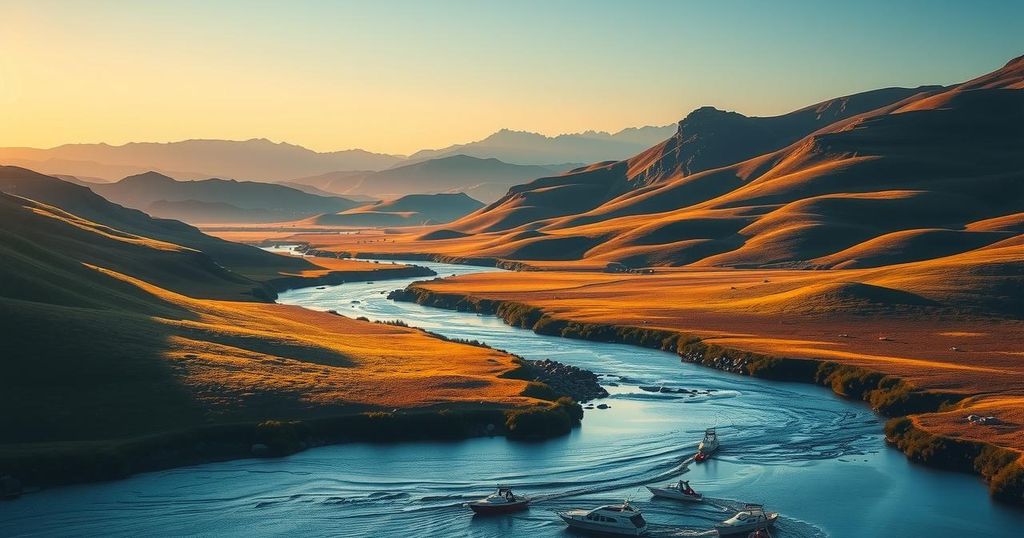Rwanda-backed M23 rebels have taken control of Goma, leading to widespread panic among its residents. The Congolese military appears overwhelmed as surrenders occur. The UN Security Council condemned Rwanda’s involvement, while the Congolese government called for a mineral export embargo against Rwanda. The ongoing conflict has displaced millions in the region and may further escalate humanitarian crises.
On Monday, M23 rebels, who are supported by Rwanda, announced their capture of Goma, the largest city in eastern Democratic Republic of Congo (DRC). Following a two-day ultimatum for the Congolese army to surrender, a state of “mass panic” was reported among the city’s two million residents. Congolese authorities labeled the rebel assault as a “declaration of war,” emphasizing the severity of the situation.
The M23 militia, comprised mostly of ethnic Tutsis, has been besieging Goma, threatening to exacerbate one of Africa’s longest-standing conflicts. Reports indicate that between 3,000 to 4,000 Rwandan soldiers joined M23 forces, overwhelming the Congolese military, which is now seeing some units surrendering to UN peacekeepers amidst ongoing chaos.
Explosions and gunfire erupted in central Goma on the morning of the capture, leading to a mass prison break that resulted in fatalities. Corneille Nangaa, a leader of the M23 alliance, stated that his forces were in control of the city as Congolese soldiers began to surrender. Government spokesman Patrick Muyaya called for civilian protection amidst this evolving war situation.
In response to the escalating conflict, the UN Security Council convened, condemning Rwanda’s support for the M23 rebels. However, Rwanda rejected this claim, accusing the Congolese government of undermining peace talks and allegedly backing extremist Hutu groups from the 1994 genocide. An appeal was made by Congo’s Foreign Affairs Minister for an embargo on minerals exported from Rwanda.
Following the unrest, UN personnel and their families were evacuated to Rwanda. The border between Rwanda and DRC near Goma was reported closed amid advisories from various countries for their citizens to leave the city due to the rising conflict. The eastern DRC remains embroiled in a complex web of rebel factions following historical tensions following the 1994 Rwandan genocide.
The M23, since its brief takeover of Goma in 2012, has historically received Rwandan support. Although initially defeated, the militia resumed hostilities in 2022, capturing significant areas rich in valuable minerals that are of interest to international corporations. As hostilities continue, humanitarian displacement has escalated, with millions already uprooted in eastern Congo.
The ongoing conflict in the Democratic Republic of Congo has its roots in regional tensions that began after the 1994 genocide in Rwanda when extremist Hutus massacred Tutsis. The M23, a Tutsi-led rebel group formed from previous military groups, has been involved in numerous offensives, seeking control of resource-rich areas. The situation remains precarious as various armed groups vie for dominance over these resources, leading to widespread civilian displacement and suffering. The international response to the conflict has varied, with countries like Rwanda accused of supporting insurgents in DRC, further complicating peace efforts. Despite numerous attempts to mediate a peaceful resolution, including UN interventions, hostilities persist, illustrating the volatile nature of the region.
The situation in Goma underscores a significant escalation in the conflict involving M23 rebels and the Congolese government, driven by historical grievances and competition over natural resources. The involvement of Rwandan troops complicates matters, raising questions about regional stability and security. With millions displaced and humanitarian crises deepening, urgent international attention is required to address the root causes of this enduring conflict and safeguard civilians caught in the midst of warfare.
Original Source: www.ndtv.com






